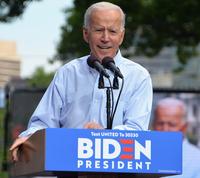The University Consortium is happy to bring you another analysis from our UC Fellows Nikita Gryazin and Dan Shapiro. The paper was originally published at the ELN website.
As popular pro-democracy movements proliferate throughout the post-Soviet space, seen in Belarus and Kyrgyzstan, EU leadership and America’s Trump Administration have had noticeably muted reactions. But should Joe Biden be elected America’s next president this week, he will likely take a more active pro-democracy position in the region, something that the EU should start planning for now.
Over the last few months, the post-Soviet region has been rocked by a wave of instability. In addition to an outbreak of war in the disputed region of Nagorno-Karabakh, the region has borne witness to mass pro-democratic movements. In Belarus, protests have run almost daily since longtime strongman Aliaksandr Lukashenka was reinstalled in an August election that was widely seen as rigged. While protestors have remained peaceful, police violence has been rampant, and the government has frequently clamped down on independent journalism and opposition political leaders. Meanwhile, in Kyrgyzstan, protests broke out after a 4th October parliamentary election that was reportedly plagued by vote-buying, and chaos ruled the country for several days as various groups vied for power. European policymakers should take into account that this trend in the post-Soviet space may be highly “contagious.” Current developments in Belarus have already been widely covered in the Russian non-state media and have inspired further protests in the Far Eastern city of Khabarovsk. Meanwhile, protestors in Kyrgyzstan see Belarus as a template for their own revolution as well. With a swathe of elections taking place: in Georgia on 31 October; Moldova on 1 November and Kazakhstan in January, observers in the EU should be on guard against the potential for further instability.
For the most part, Europe and the US have dragged their feet on these issues. In Belarus, whilst the EU has now placed visa bans and asset freezes on 40 Belarusian officials supposedly involved in voter fraud and suppression of the opposition, these measures were taken almost two months after the August elections. So far the EU is, as yet, only “warning” to sanction Lukashenka himself. The US, meanwhile, has led the charge in inaction: aside from a few vague statements, the Trump administration has been almost entirely silent on Belarus, with pundits accusing Trump of going “AWOL” on the issue and the Trump administration itself saying that “rhetorical support” is the best that the US can offer the pro-democracy movement. In Kyrgyzstan, it is too early to tell exactly what the Trump administration will do but given the experience of Belarus, it’s unlikely to be much.

Should Joe Biden be elected president of the US this week, this pattern of US inaction in the region could change markedly. During his Presidential campaign, the topic has become one of the most important in his foreign policy agenda: Biden was one of few American politicians who loudly raised the problem of systematic repression in Belarus and recognised the people of Belarus who are currently “demanding their voices be heard.” He denounced both Lukashenka’s August reelection as fraudulent and the violent way in which the regime is dealing with the protesters. He concluded that his “administration will never shy away from standing up for democratic principles and human rights”—a clear signal that a Biden presidency will support democratic movements in the region and plan to contain regimes that are violating human rights. Biden also accused Donald Trump of remaining silent on “weak, illegitimate autocrat” Lukashenka and refusing to offer support for the pro-democracy movement. These statements are made more important given that Russia and the post-Soviet space have significantly increased in importance over the last few years in the eyes of the American political establishment and intelligence community mainly due to the Ukraine crisis and Russia’s alleged interference in US elections. Biden’s statements, added to broader recent dynamics in the US-Russia relationship, strongly suggest that Joe Biden’s leadership would likely mark the return of a more active foreign policy and much more significant American involvement in the relatively unstable Eastern part of the region, including the post-Soviet space.
Read the full article here.